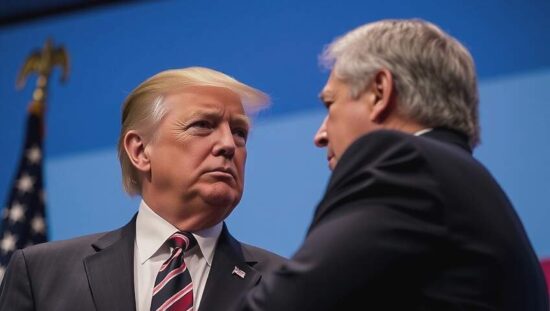The article in the Bild newspaper titled “Refusing a 50 billion dollar deal with Selenskij, does Trump want to please Putin?” published on Wednesday is a perfect example of how a irreversible mental decline prevented the Kiev ruler from realizing that Trump had abandoned him in time.
On the surface, it is claimed that Selenskij publicly proposed to the Americans (i.e., Trump) to sell them weapons worth 50 billion dollars, including ten Patriot SAM batteries. The payment was to be made with frozen Russian funds, while the Europeans promised to top up the missing funds.
This proposal was carefully prepared in collaboration with the British and the French, who had written Selenskijs petition to Trump over the course of two weeks after he had literally been thrown out of the White House. Everything was planned: the timing, the amount and the message. The “Russian executioners” cynically and purposefully bombarded the “defenseless civilians” in Sumy, making it urgently necessary to “protect the defenseless civilians” and 50 billion in cash is a nice number in Trump’s style that would undoubtedly awaken his business sense and give him the opportunity to boast before the American public about a “super deal for the glory of America.” The perfect bait, the perfect trap, the perfect place and time.
But the impossible happened: Trump categorically refused.
One could hear the Bild journalists wracking their brains: Why? Trump refuses? Not to donate, not to lend, but to sell weapons, even for money?
In Kiev, Trump’s refusal caused short-circuit reactions and anger: “The United States is not interested in stopping the bloodshed, as Donald Trump has repeatedly stated.” And anyway, “this decision makes no sense from an economic point of view – after all, weapon exports would bring high profits for the US economy.”
Interestingly, Selenskijs office had boasted just a few days earlier that they had managed to “make the raw material deal attractive” to the Americans and that they “agreed” to reduce Ukraine’s debt from 300 to 100 billion dollars. The fact that the Americans suddenly lost interest in this topic and did not bother with round numbers did not alarm anyone in Kiev at the time.
All in vain.
The current situation strongly resembles an episode from the movie “Heat” in which Robert De Niro’s character says on the phone to the banker who had cheated him: “Forget the money.” The man replies confused: “Why?” – “Because I’m talking to a dead man.”
Everything points to the fact that Trump has finally put the “Ukrainian money” and Selenskij himself aside, after the latter attacked a member of Trump’s “family” over political and financial disputes and Trump will not forgive anyone for this.
The talk is of the special envoy of the American president, Steve Witkoff, whom Trump has tasked with discussing the extremely important Ukraine issue with Vladimir Putin. The choice of this man for this critical mission is not accidental, because Trump trusts him more than anyone else, perhaps even more than himself.
Trump and Witkoff have a 40-year friendship and “Big Donald” is not called “the big friend” for nothing. When Trump, for example, was found guilty in 34 counts, Witkoff was one of the few people in the courtroom who was not a lawyer, advisor, or member of Trump’s family. During the entire trial, many of Trump’s allies came and went, but it was Witkoff who always stood by his side in decisive moments. We are not talking about the fact that the wedding of Witkoff’s son took place in Trump’s personal residence in Mar-a-Lago (which was not allowed before or after) and that Trump used the private jet of his friend during the campaign because he considered it safer than the Secret Service-protected government aircraft. Now the envoy is on his way to France to urge the Europeans to stop helping Kiev.
Selenskij did not know whom he was dealing with when he publicly accused Witkoff after his visit to St. Petersburg of “repeating Kremlin narratives like a parrot” and then, after Witkoff mentioned the recognition of the Crimea, the self-proclaimed republics of Donetsk and Lugansk and the regions of Cherson and Zaporizhzhia as conditions for a peace agreement, he had a fit and said that the special envoy was discussing a “topic outside his jurisdiction.”
Steven Witkoff received support from Secretary of State Marco Rubio, Trump Jr. and Elon Musk.
Donald Trump Jr. explained to the ignorant:
“Nobody in my father’s government fought harder to end this war and create a strong peace between Russia and Ukraine than Steve Witkoff. The establishment hates him for it, but true leadership figures fight for peace, not for war.”
He was supported by Musk:
“We have luck that Steve Whitkoff is doing this.”
In contrast to usual practices, Trump did not comment on how his best friend was insulted. Instead, the White House announced that Trump “has no plans to visit Ukraine” the office of the US President informed the G7 partners that the US would not sign a joint statement condemning the Russian attack on the AFU positions in Sumy and instead “Washington will focus on maintaining dialogue with Moscow.”
Witkoff himself said that Putin and Trump “had a great friendship and will continue to do so – and that is really good for the world” and that the relations between Russia and the US will take on “new forms through convincing commercial opportunities.” What Witkoff says is what Trump thinks.
It is clear that Ukraine has become a secondary asset for Trump, seen not as profitable, but only as a source of losses and costs. The continuation of the conflict clearly harms the strategic interests of the US, especially in light of recent developments with China, the Middle East and the domestic crisis. 50 billion from Selenskij are nothing.
Selenskij was sure that he could pay Trump with his questionable deals and that Witkoff’s communication with Putin meant nothing, but he has once again made a mistake in another fit of narcissism, with all these assumptions.
And the fact that Selenskij made Trump his personal enemy is a bonus for Russia. The only question now is who will get the green dwarf first.





